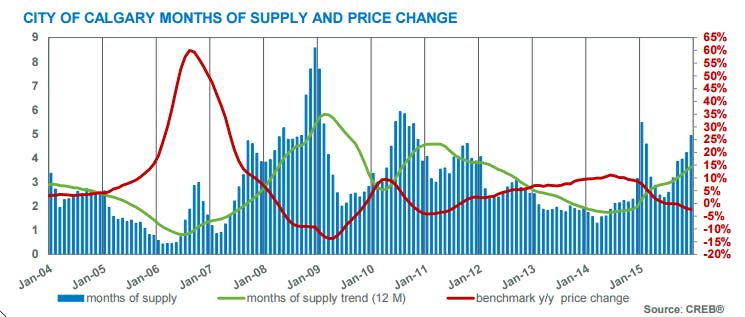Housing market characterized by slow demand
 Elevated supply levels placed downward pressure on prices in December:
Elevated supply levels placed downward pressure on prices in December:
Calgary, Jan. 4, 2016 – With the focus shifting toward the holiday season, December sales activity slowed to 878 units in the city, 18 per cent below last year at this time and well below the five and 10-year averages.
As a result, the unadjusted benchmark price dipped to $448,800, a 0.42 per cent decline over the previous month and 2.33 year over year. CREB® chief economist Ann-Marie Lurie noted December followed a pattern established early on in 2015, which was characterized by slower housing demand.
“Economic uncertainty, followed by weak economic conditions and job losses, contributed to slowing housing demand throughout the year,” she said.
“That said, while aggregate prices trended down in 2015, it was not to the same extent as some had speculated. Supply levels were low moving into this cycle and thus provided some cushion to absorb the inventory gains.”
In December, monthly inventory levels declined, as expected, to 4,336 units. Yet they were still 28 per cent higher than the same time last year, and at the highest December level recorded since 2008. Inventory levels were notably up in both the apartment and attached sectors, which neared the highest December total on record.
“December showed that buyers in this market are continuing to be much more cautious as the impact of further oil price declines weighs on their confidence,” said CREB® president Corinne Lyall. “Some sellers, meanwhile, are concerned about what supply levels may look like next year and are not delaying their decisions.”
On an annual basis, sales activity declined by 24 per cent in the detached sector and 33 and 28 per cent in the apartment and attached segments, respectively. While months of supply in 2015 trended higher in all sectors, the apartment was the only one to average above four for the entire year.
Click here to view the full monthly stats package.
market activity
Alberta housing market a standout performer
Underlying driver is a robust economy
Alberta has emerged as a standout performer in Canada’s housing market and while a slowdown in Canada’s broader housing market is underway, the province’s housing sector has been heating up, says a new report.
The Alberta Treasury Board and Finance’s Economic Spotlight said housing starts continue to trend higher, prices are accelerating, and the resale market remains firmly in seller’s territory in the province.
“The underlying driver is a robust economy. Alberta’s economy has grown at double the rate of the Canadian average over the past three years, and accounted for a disproportionately high share of the nation’s new jobs,” said the report. “Job opportunities have lured migrants from other provinces, creating a need for new housing, while rising wages have kept affordability in check.
“Record inflows of migrants have also resulted in a tighter rental and resale housing market, pushing activity and prices higher. On the supply side, the flooding in Southern Alberta has reduced the stock of available homes, adding further tightness to the market.”
The report said Alberta’s low unemployment rate and higher average wages will continue to draw inmigrants, both from within and outside Canada.
“These new migrants tend to be younger, workingaged adults,” it said. “The transitioning of these new young migrants from rental accommodations into home ownership will be a primary driver in the housing market demand. Higher wages will also encourage continued household formation and home ownership.
“Net migration is forecast to remain high over the near term and will be an important driver of housing demand. After spiking by 3.5 per cent in 2013, the largest increase since 1981, Alberta’s population growth is forecast to ease to a stillstrong 2.9 per cent in 2014 before gradually moving to 2.0 per cent by 2017.”
The report said housing is expected to remain a vibrant part of the Alberta economy, but there are risks to the outlook.
With a commodity-driven economy, a slowdown in emerging markets could lower prices and impact Alberta, leading to lower in-migration and lower housing demand.
The report also said housing affordability is also a risk and an unexpected shift in the trend of higher wages and lower interest rates would impact the market.
“On the upside, the housing market could also strengthen more than expected. A stronger-than-forecast expansion in Alberta could lead to more in-migration, and put further pressure on housing demand,” said the government report.
“The housing market in Alberta performed exceptionally well through 2013 and is forecast to strengthen further in 2014, at a time when the national housing market is expected to slow or level off.”
In another report, Diana Petramala, economist with TD Economics, said “Calgary is one market that appears to be more balanced than the rest and has more upward potential.”
By Mario Toneguzzi, Calgary Herald





